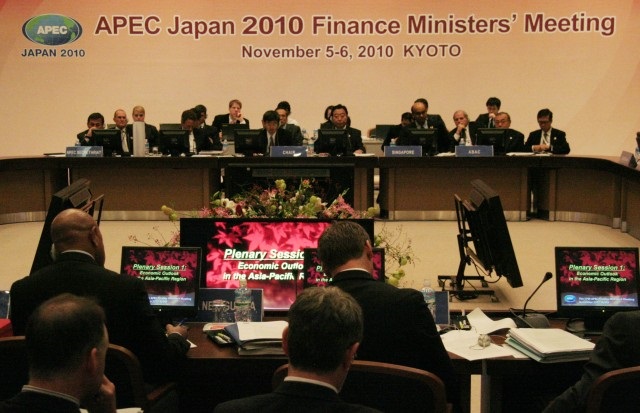2010 APEC Finance Ministerial Meeting

2. We exchanged views on current economic and financial developments and policy direction in the Asia-Pacific region. Recognizing APEC's strength in consensus-building and implementing multi-year initiatives, we emphasized the importance for APEC members to take policy measures to achieve stronger, more sustainable and more balanced growth in the region.
3. The global economy is recovering from the recent financial crisis, but uncertainty remains. Growth in the region is uneven across the economies, with developing economies experiencing a strong recovery, while advanced economies are recovering more slowly. Net capital flows have returned in a significant volume to emerging economies of the region, raising the risk of capital flow volatility and increases in asset prices in some economies. Financial reforms are proceeding and we should continue to take steps to build a stronger and more resilient global financial system. We remain committed to maintaining open markets and fighting protectionism. We reaffirmed our common resolve to support the recovery in a collaborative and coordinated way.
4. As a key contribution to the discussion of the APEC Leaders' Growth Strategy, we are submitting "The Kyoto Report on Growth Strategy and Finance" to the Leaders. In this Report, we have identified priorities for securing future growth, namely, rebalancing and strengthening global demand, pursuing sound fiscal management, and enhancing finance to key sectors such as infrastructure, small and medium enterprises, households and green investment.
5. We support the conclusions of the recent G20 Finance Ministers and Central Bank Governors Meeting in Gyeongju and will strengthen multilateral cooperation to promote external sustainability and pursue the full range of policies conducive to reducing excessive imbalances and maintaining current account imbalances at sustainable levels. We will continue to undertake structural reforms and foster job creation.
6. Because of the weight of APEC economies in the global economy, and given the importance of balanced growth in the region, it is incumbent upon each member, whether a surplus or deficit economy, to implement necessary policy measures. Economies with current account deficits will need to take steps to boost domestic saving, including through medium-term fiscal consolidation, while ensuring that consolidation is carefully sequenced, with attention to local economic conditions, so as not to derail nascent recoveries. Economies with current account surpluses need to reduce their reliance on external demand and undertake structural reforms that catalyze stronger domestic demand-led growth, such as enhancing infrastructure finance and strengthening social safety nets.
7. We will move towards more market-determined exchange rate systems that reflect underlying economic fundamentals and will refrain from competitive devaluation of currencies. Advanced economies, including those with reserve currencies, will be vigilant against excess volatility and disorderly movements in exchange rates. These actions will help mitigate the risk of excessive volatility in capital flows facing some emerging economies.
8. Ensuring sound fiscal management and instituting a credible and growth-friendly fiscal consolidation plan form an indispensable part of our growth strategy. Improving the efficiency of public finance management supported by medium-to-long term budget planning is also important. Aging populations pose a challenge, not only for advanced economies, but also for many of the emerging economies which plan to put in place broader social safety nets. We will take measures to ensure, based upon specific circumstances of the economies, that the increase of age-related expenditure will not undermine long-term fiscal sustainability. At the same time, we agreed to the importance of enhancing productivity of the working population through strengthening structural policies including investment in human capital.
9. We need to ensure appropriate financing for several key areas to strengthen growth. Financing for infrastructure, both domestic and regional, contributes to enhancing productivity, alleviating poverty and improving access to social service delivery systems. In this regard, we will continue to support emerging APEC economies in the implementation of Public-Private-Partnership (PPP) infrastructure projects, including through a new mentoring program to be launched next year. Trade facilitation and customs modernization should go hand in hand with the scaling-up of regional infrastructure, with the view to furthering regional integration.
10. Efficient and affordable financial services are critical to the success of economic activity at all levels including the micro, small and medium enterprise, and the households sectors. To this end, we have launched an APEC Financial Inclusion Initiative to identify concrete actions that financial policy makers can take to expand the reach of financial services to the underserved.
11. Finance that enables and supports projects that address climate change is indispensable to strong and sustainable green growth. In this regard, we take note of the importance of the APEC Green Growth Initiative that seeks to share best practices in the region and to produce recommendations to strengthen green growth.
12. Sound and well functioning financial systems are critical for sustainable growth and the efficient allocation of resources. We are committed to take action at the domestic and international levels to raise standards, so that our domestic authorities implement global standards consistently, in a way that ensures a level playing field and avoids fragmentation of markets, protectionism and regulatory arbitrage. We also recognize the importance of creating more open and integrated financial markets in the region, and welcome efforts to facilitate cross-border marketing of fund management services within Asia.
13. The close cooperation with the business community is also a unique feature of APEC. We welcomed inputs from the ABAC, which put forward concrete recommendations on the promotion of infrastructure public-private partnership, small and medium enterprise finance, financial inclusion, regulatory reforms and the development of bond markets.
14. We thanked Japan for hosting the APEC Finance Ministers' Process this year. We will meet again for our 18th meeting in Honolulu, U.S.A., in November 2011.

